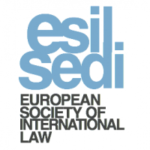ESIL and Stockholm Center for International Law and Justice (SCILJ) Joint Online Event
 While the 16th ESIL Conference in Stockholm has been postponed until 2021, the traditional “current events” discussion will be held online on 10 September 2020 at 15-17.00 (CEST), as a joint event between ESIL and the Stockholm Center for International Law and Justice (SCILJ). The theme of the event will be: ‘Covid-19 and international law: science and disinformation, exceptions and emergencies’.
While the 16th ESIL Conference in Stockholm has been postponed until 2021, the traditional “current events” discussion will be held online on 10 September 2020 at 15-17.00 (CEST), as a joint event between ESIL and the Stockholm Center for International Law and Justice (SCILJ). The theme of the event will be: ‘Covid-19 and international law: science and disinformation, exceptions and emergencies’.
Link to join Webinar: https://stockholmuniversity.zoom.us/j/62227052015
The event will include two panels:
Covid-19 and International Law: Science, Tech, Trolls and the Role of Information
Questions that will be addressed on this panel will include:
- What has been the role of science in political and administrative decision-making? How have choices between different hypotheses been made and which science has not been used?
- How has IT been used to provide information about individual and social behaviour to authorities and governments? How does that impact on privacy rights?
- How have governments countered misinformation and suppressed information, and what role has international law played in that?
- What is the responsibility – legal or otherwise – of social media platforms in removing and preventing misinformation?
Panelists
- Gloria González Fuster (Vrije Universiteit Brussels)
- Marko Milanovic (Nottingham)
- Jiří Přibáň (Cardiff)
- Philippa Webb (moderator; King’s College, London)
Covid-19 and International Law: Emergencies, Exceptions and Regime Contestation
Questions to be covered in this panel include:
- How have potential prima facie conflicts between health concerns and other international law regimes been managed? As “regime contestation” or through mutual accommodation via established exceptions in the various agreements?
- Have such conflicts been conceptualised as “regular exceptions” (such as those handled routinely by human rights bodies, WTO panels and others) or as “emergency exceptions” (like derogations) or necessity (Article 25 of the Articles on State Responsibility)? In other words, have they been thought of as being already covered by the telos of the respective instruments, or as new, extraordinary events?
- Are such exceptions, whether “regular” or “exceptional”, subject to review by a competent international body? If so, will that body be able to consider all aspects of the issue? What will be the place of scientific knowledge in such review processes?
Panelists
Anne van Aaken (moderator; University of Hamburg)
Gian Luca Burci (Geneva Academy)
Jürgen Kurtz (European University Institute)
Federica Paddeu (Cambridge)
***
The event is prepared by a committee consisting of Anne van Aaken (Hamburg), Gleider Hernández (KU Leuven), Philippa Webb (King’s College) and Pål Wrange (Stockholm), assisted by Mark Klamberg (Stockholm) and Jarna Petman (Stockholm).
MORE INFORMATION



